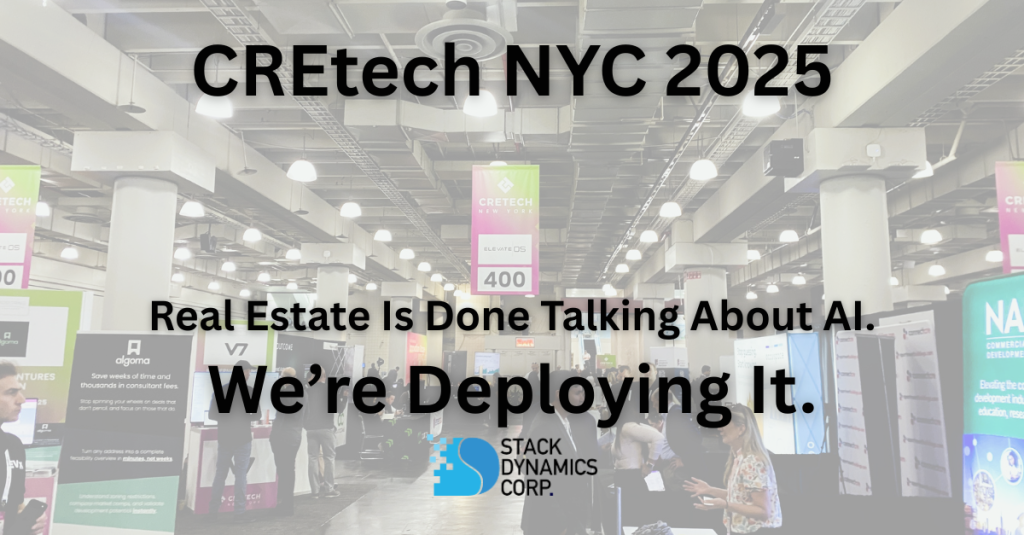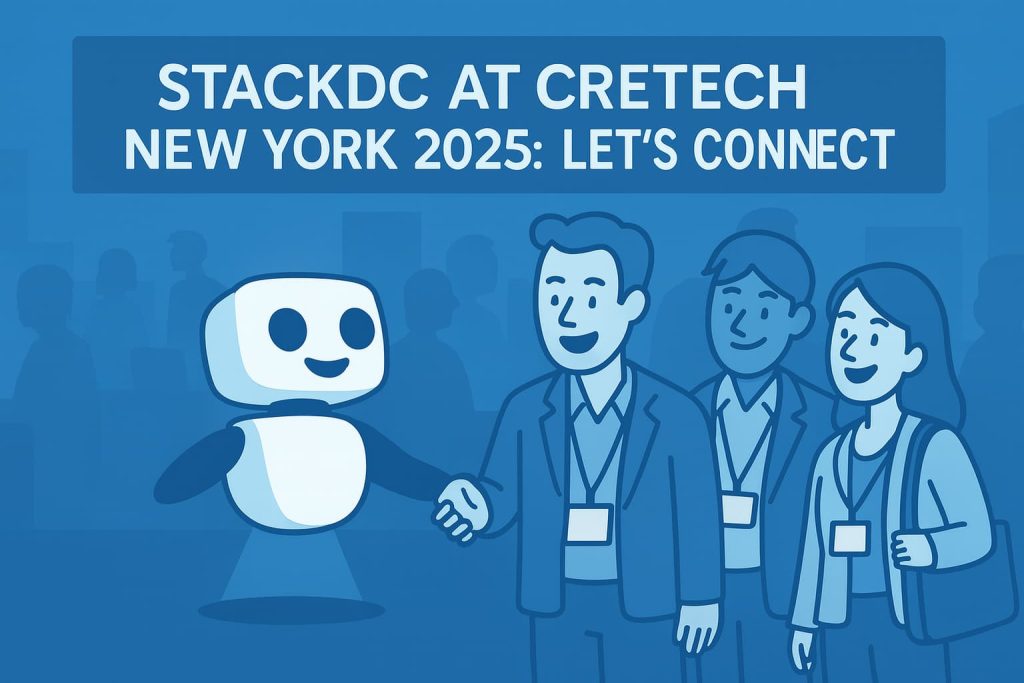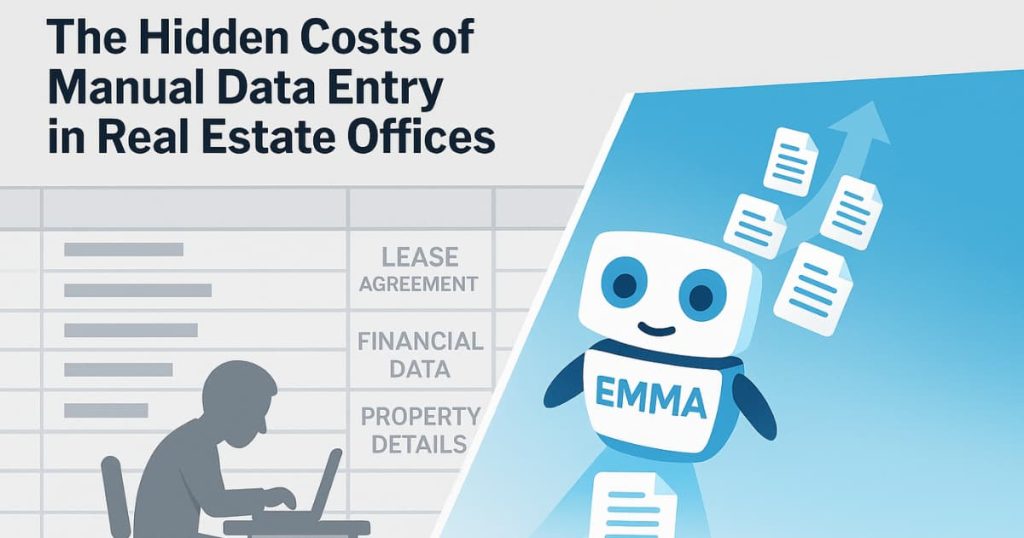From Hype to Implementation: Key Takeaways from CREtech NYC 2025

October 24, 2025 The energy at CREtech NYC 2025 was different this year. After two days at the Javits Center, surrounded by nearly 3,000 real estate professionals and over 1,000 solution providers, one thing became abundantly clear: the commercial real estate industry has crossed a threshold. The conversation has shifted from “What can AI do?” to “How do we implement AI today?” The Conference Landscape CREtech NYC returned as the flagship event of NYC Real Estate Tech Week, bringing together an impressive roster of industry leaders, from CEOs of major REITs to heads of corporate real estate at Fortune 500 companies. The conference introduced a new Hosted Meetings Program this year, facilitating over 1,500 pre-scheduled one-on-one meetings between solution providers and qualified buyers—a format that underscored the industry’s demand for actionable connections over theoretical discussions. For StackDC, these two days were packed with productive meetings with prospective clients and exploratory conversations with venture capitalists active in the proptech space. What we heard consistently validated our core thesis: the market is hungry for practical AI solutions that integrate with existing workflows and deliver measurable ROI. Key Themes: The Industry’s New Priorities 1. Stop Getting “AI-Ready” and Become AI-Active Today One of the most compelling sessions bore this exact title, and it captured the prevailing sentiment across the conference. The era of preparation is over. Companies are no longer asking if they should adopt AI. Some 90% of commercial real estate firms plan to integrate AI into their operations, according to research from JLL highlighted at the event. The question now is how to deploy AI in ways that solve immediate problems. Attendees weren’t interested in five-year roadmaps or transformational visions. They wanted to know: What can I implement next quarter? What will save my team time next month? What will improve our margins this year? 2. Practical Applications Across the Real Estate Value Chain Throughout our meetings and the conference sessions, we saw companies exploring tangible AI applications across every segment of the real estate value chain: Property Management & Operations: AI agents handling tenant maintenance requests, optimizing building operations through predictive maintenance, and managing energy consumption in real-time. Leasing & Marketing: Automated lead nurturing, AI-powered tour scheduling, and the generation of bespoke marketing materials tailored to specific stakeholders, all at scale. Investment & Analytics: AI-driven market forecasting, risk assessment tools, and automated underwriting that reclaims hours of analyst time for higher-value strategic work. Design & Construction: Generative design tools, project management automation, and cost optimization platforms transforming the AEC sector. The common thread? These aren’t moonshot projects. They’re practical tools addressing specific inefficiencies that real estate professionals face every day. 3. Workflow Integration is Non-Negotiable Perhaps the most important insight from our conversations: solutions that require companies to abandon their existing systems face insurmountable adoption barriers. The most successful AI tools function as “digital coworkers”—they enhance current workflows rather than replace them. Multiple sessions emphasized the challenge of data silos and the critical need for unified platforms that aggregate data streams to provide smart, actionable insights. The message to proptech companies was clear: if your solution doesn’t integrate seamlessly, it won’t get adopted, regardless of how powerful it is. This resonated deeply with our approach at StackDC. Our AI-enabled workflow automation is designed specifically to fit into how real estate professionals already work, particularly within the back-office operations that are often overlooked but critically important. 4. ROI Over Hype The industry has matured beyond buzzwords. Every conversation eventually came back to return on investment. Decision-makers want to see clear metrics: How much time does this save? How much does this reduce operational costs? How quickly will we see results? The shift from “growth at all costs” to strategic, ROI-focused technology investment was palpable. Companies are willing to invest in AI, but they’re demanding proof of value, and they’re demanding it quickly. The Agentic Future A fascinating emerging concept discussed throughout the conference was “agentic AI,” or AI systems that can act autonomously as digital team members. Rather than tools that require constant human direction, agentic AI can handle complete workflows: responding to tenant inquiries 24/7, managing maintenance workflows from request to completion, or nurturing sales leads through the entire funnel. This represents the next evolution of proptech: moving from automation of individual tasks to autonomous management of entire processes. For companies struggling with staffing challenges and operational inefficiencies, this vision is particularly compelling. What Resonated: StackDC’s Message in the Market Our meetings with prospective clients and VCs reinforced that StackDC’s positioning hits the market at exactly the right moment. Our message—practical AI solutions that integrate with existing workflows and generate quick ROI—resonated consistently because it addresses the industry’s current pain points: The conversations we had weren’t about convincing people that AI matters—they already know that. They were about demonstrating that our approach to AI implementation aligns with how real estate companies actually operate. Conclusions: The Market is Ready Walking away from CREtech NYC 2025, several conclusions are inescapable: The window is open: With 90% of firms planning to adopt AI, the market opportunity for practical proptech solutions is massive. And it’s happening now, not in some distant future. Practicality wins: The companies that will succeed in this market are those that solve specific problems with measurable results. The era of “disruptive” solutions that require complete operational overhauls is over. The era of practical tools that make existing workflows smarter has arrived. Integration is everything: The most significant barrier to adoption often isn’t cost or capability, it’s friction. Solutions that integrate seamlessly will capture market share; those that don’t will struggle regardless of their technical sophistication. The industry is sophisticated: Real estate professionals understand AI’s potential and its limitations. They’re not looking for magic; they’re looking for tools that work. They want partners who understand their business, not technologists who want to reinvent it. For StackDC, CREtech NYC 2025 validated our strategy and energized our team. The meetings we held, the conversations we had, and the interest we generated all
StackDC Attending Yardi Advanced Solutions Conference Canada 2025

StackDC is attending the Yardi Advanced Solutions Conference (YASC) Canada, bringing together the brightest minds in real estate operations, technology, and automation.
StackDC at CREtech New York 2025

Let’s Connect at the Premier Event for Real Estate Innovation We’re excited to announce that the StackDC team will be attending CREtech New York 2025, the premier event bringing together leaders at the intersection of real estate, technology, and AI innovation. This year’s agenda dives deep into how automation, data, and sustainability are reshaping the CRE industry — themes that resonate strongly with our mission. At StackDC, we’re helping real estate organizations eliminate manual data work through AI-first back-office automation, from invoice coding and payment workflows to document intelligence and portfolio analytics. If you’re attending CREtech, we’d love to connect. Whether you’re exploring how AI can reduce admin costs, accelerate collections, or bring intelligence to your operations, our team will be on-site to share recent breakthroughs and client results. 📅 CREtech New York 2025, part of NYC Real Estate Week📍 Javits Center, NYC📆 October 21-22, 2025 👉 Let’s meet at CREtech!Reach out via LinkedIn or message us directly to schedule a chat. As a proud sponsor of this CREtech event, we have limited VIP passes available as well. Get in touch to learn more. Together, we can reimagine how real estate operates — smarter, faster, and more agentic. Other Recent Posts:
Unmasking the Silent Drain: The True Cost of Manual Data Entry (and How AI Workflow Automation Revolutionizes Real Estate)

In the dynamic world of real estate, efficiency is paramount. Yet, walk into countless real estate offices today, and you’ll likely witness a familiar scene: teams engrossed in the painstaking process of manual data entry. Updated clauses in lease agreements are typed line by line, intricate financial data is painstakingly keyed into spreadsheets, and crucial property details are copied multiple times from one system to another. This widespread practice, often perceived as an inexpensive solution – “just hire a couple of admin staff and get it done” – is, in reality, one of the most significant, yet often overlooked, drains on profitability and operational agility within the industry. The quiet truth is that manual data entry is a costly habit, silently eroding the bottom line. Studies consistently highlight that data entry errors alone cost businesses billions of dollars annually. For real estate companies, where transactions involve high-value contracts, sensitive tenant information, and recurring billing cycles, even a seemingly minor mistake can cascade into severe consequences. We’re talking about compliance risks, significant payment delays, damaged vendor trust, and ultimately, a substantial impact on revenue. It’s time to pull back the curtain and expose the true financial and operational burden of outdated processes, and then explore how AI workflow automation offers a transformative solution, redefining efficiency for modern real estate enterprises. Why Do So Many Real Estate Firms Still Cling to Manual Processes? The inertia towards change is a powerful force, especially in an industry as deeply rooted in tradition as real estate. While the detrimental effects of manual data entry are undeniable, several factors contribute to its persistent presence: The Real Price Tag of Manual Data Entry for Businesses: Unveiling the Hidden Costs The notion that manual data entry is a cost-effective approach is a dangerous illusion. The true expense extends far beyond salaries, manifesting in a multitude of ways that silently bleed resources from a real estate business. 1. The Escalating Labor Costs of Manual Data Entry As your real estate portfolio expands, so does the relentless demand for manual data entry personnel. This isn’t just about initial salaries; it encompasses a much broader spectrum of expenditures: 2. Data Entry Errors and Their Business Impact: A Cascade of Consequences The human element, while indispensable for strategic thinking, is inherently prone to error in repetitive tasks. Even a single misplaced digit can trigger a catastrophic chain of events: 3. Productivity Loss from Manual Data Entry: Squandered Potential Your highly skilled property managers and agents are hired for their expertise. Yet, a significant portion of their valuable time is often siphoned off into mundane, repetitive tasks associated with manual data entry. 4. How Manual Data Entry Delays Cash Flow: The Financial Bottleneck In real estate, predictable and timely cash flow is the lifeblood of the business. When invoicing, rent reminders, and payment processing are reliant on manual data entry, the entire financial cycle slows down significantly: 5. Compliance Risks in Manual Data Entry: Navigating the Regulatory Minefield Real estate firms handle an immense volume of sensitive financial and personal data daily. Manual data entry introduces significant vulnerabilities and amplifies compliance risks in manual data entry: How StackDC AI Workflow Automation Addresses Manual Data Entry Challenges: Manual data entry continues to be one of the most time-consuming and error-prone aspects of real estate operations. StackDC’s AI workflow automation suite Unity provides a practical approach to streamline these processes. Rather than replacing human expertise, it supports teams by reducing repetitive work, minimizing errors, and ensuring data moves efficiently through the system. 1. AI Workflow Automation Reduces Labor Dependency: Supporting Scalable Operations Manual data entry often limits how fast a business can grow. With StackDC’s AI workflow automation solutions, firms can manage larger data volumes without proportionally increasing staff. 2. StackDC’s AI Automation Solutions Improve Accuracy and Reduce Errors: Consistency in Data Human error is an unavoidable part of manual entry. StackDC’s AI automation helps reduce these risks and supports more reliable outcomes. 3. Boost Productivity with AI Workflow Automation: Freeing Up Time Automation helps teams focus on higher-value tasks rather than routine typing and verification. 4. StackDC’s Unity AI Automation Workflows Support Cash Collection: Improving Efficiency in Revenue Cycles Delays in billing and collections impact business growth. StackDC’s suite of automation solutions helps streamline parts of this process. Our AI Workflow Automation Use Cases Across Real Estate The versatility of AI workflow automation makes it applicable across virtually every department: The Unmistakable ROI of our AI Workflow Automation vs Manual Data Entry For real estate companies, the ROI of our AI workflow automation vs manual data entry is transformative. Firms that embrace this shift consistently report significant, measurable gains: How to Replace Manual Data Entry with StackDC’s AI Workflow Automation Solutions: Your Automation Blueprint Embarking on an automation journey doesn’t have to be overwhelming. A strategic, phased approach ensures a smooth and successful transition: Conclusion: Manual Data Entry vs StackDC AI Workflow Automation – A Clear Choice The comparison between manual data entry vs Document AI with StackDC’s Unity AI workflow automation suite reveals a stark reality. While manual processes might appear affordable on the surface, they are, in fact, a silent, pervasive drain on profitability, a significant drag on productivity, and a continuous source of compliance risk for real estate firms. Our AI workflow automation doesn’t just plug these costly leaks; it fundamentally transforms operations. By eliminating human error, accelerating financial cycles, and freeing up your most valuable asset – your human talent – it empowers your team to focus on strategic growth, client relationships, and innovation. The choice is clear: embrace the future of efficient, intelligent real estate operations or remain tethered to outdated practices that erode your competitive edge. StackDC’s AI Workflow Automation platform, powered by Unity Document AI OCR, core no-code workflow builders, Unity IQ data visualization and Niva AI agentic orchestration is specifically designed to eliminate manual data entry in real estate. From automating the extraction of critical data from lease agreements and property records with Unity Document

